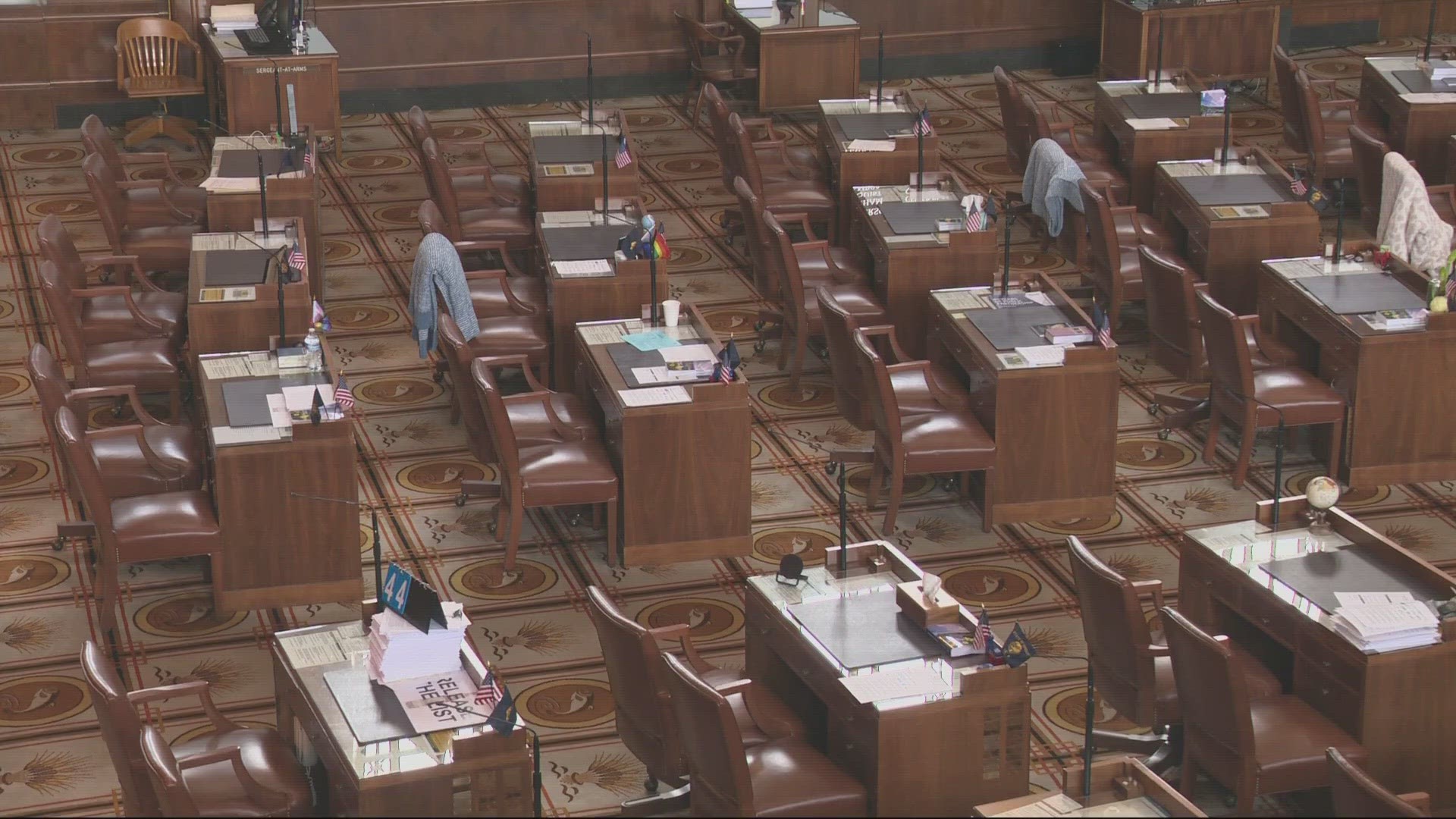SALEM, Ore. — Several Oregon Senate Republicans didn't show up for work on Wednesday, kicking off the latest in a series of legislative walkouts that the party has staged in recent years.
Walkouts are stall tactics employed by the minority party, usually to kill specific legislation. Most bills only require a simple majority vote to pass, but the Senate and House can't hold votes unless a quorum is present, meaning at least two-thirds of each chamber's members.
Democrats hold 17 of the Oregon Senate's 30 seats and 35 of the House's 60 seats, which means they have enough votes to pass most (but not all) legislation without Republican support, but they can't achieve a quorum in either chamber on their own. If enough Republicans walk out, business grinds to a halt.


Democrats have held majorities of varying sizes in both chambers in nearly every session since 2007, but they've never managed to win the two-thirds majority that they'd need to overcome Republican walkouts.
Oregon is one of only a handful of states that require more than a simple majority for a quorum, and the other outliers have also faced walkouts. Texas Democrats have also made headlines in recent years for employing the tactic to block Republican majorities on issues like voting access.
Below is a timeline of walkouts that lawmakers have held in the Oregon Legislature. Read on for more information about each walkout.
Click through the arrows on the interactive timeline to read more about Oregon's history with walkouts
First walkout since Measure 113
The recent Republican walkouts in Oregon spurred talk among Democrats of lowering the quorum threshold. Those efforts never panned out, but a separate grassroots campaign eventually put Measure 113 on the ballot, creating penalties for walkouts.
Oregon voters passed the measure by a more than two-to-one margin last year. Lawmakers with 10 or more unexcused absences in a single legislative session will now be barred from running for the legislature or holding a legislative seat in the next term.
The current walkout appears to be the first test of the new rules, although it remains to be seen whether it will last long enough to trigger the penalties for a 10-day absence. There are still more than 8 weeks left in the session.
Previous Oregon walkouts
In Oregon, the walkout tactic has become most heavily associated with Senate Republicans in recent years, but both parties have used the tactic in the past, and in both chambers.
The frequency has undeniably increased from 2019 onward, but use of the tactic in Oregon dates all the way back to 1971. Here's a rundown of past Oregon walkouts, in reverse chronological order:
September 2021: Redistricting
- Instigated by: House Republicans
- Duration: 2 days
- Targeted legislation: Senate Bill 881
- Result: SB 881 passed after Republicans returned
House Republicans boycotted a Saturday session near the end of Oregon's legislative redistricting process, accusing Democrats of pushing through a map designed to win them five of the state's six seats in the U.S. House.
Republicans returned the following Monday, and Democrats were able to pass the plan just before a deadline that would have kicked the task of drawing the maps to the secretary of state and a committee of judges.
February 2021: COVID restrictions
- Instigated by: Senate Republicans
- Duration: 5 days
- Targeted legislation: None (protest against executive actions)
- Result: None
Walkouts are typically aimed at killing specific pieces of legislation, but in this case Senate Republicans said they were protesting COVID-19 restrictions put in place by Gov. Kate Brown, according to The Oregonian.
The brief walkout happened at an early point in the session, delaying the introduction of several bills, but had little lasting impact. Republicans returned the following week, according to OPB.
February 2020: Cap and trade
- Instigated by: Senate Republicans
- Duration: 4 days
- Targeted legislation: Senate Bill 1530
- Result: SB 1530 and many other bills died
Senate Republicans walked out to block Senate Bill 1530, a revised version of a cap-and-trade climate plan that they had previously killed through walkouts in the 2019 session.
The walkout began Feb. 24 and ended a few days later when Republicans agreed to come back for the final day of the short session, but only to vote on emergency budget bills.
The climate plan was one of several bills that wound up dead, drawing harsh criticism from Democrats over what they said became a largely failed session due to the Republicans' tactics.
June 2019: Cap and trade
- Instigated by: Senate Republicans
- Duration: 9 days
- Targeted legislation: House Bill 2020
- Result: HB 2020 died
Republican Senators walked out and in some cases even physically left Oregon in order to block House Bill 2020, the first version of the cap-and-trade plan. The walkout began on June 20, three days after the House passed the bill.
Senate President Peter Courtney admitted on June 25 that the bill likely didn't have enough support from Senate Democrats to pass even if the vote could be held, and Republicans declared the bill dead and the walkout over on June 28.
May 2019: Education funding
- Instigated by: Senate Republicans
- Duration: 7 days
- Targeted legislation: House Bill 4327
- Result: HB 4327 passed, other bills tabled in exchange
Earlier in the 2019 regular session, Senate Republicans walked out for four days to protest a school funding tax package.
They relented when Gov. Kate Brown reached a deal to hold off on separate legislation about gun control and school vaccine requirements. Brown signed the education package a few days later.
March 2007: Taxes
- Instigated by: Senate Republicans
- Duration: 1 day
- Targeted legislation: Tax-related bill
- Result: Missing senators returned
According to the Statesman Journal and former KGW political analyst Len Bergstein, Gov. Ted Kulongoski sent state troopers to an OSU Beavers baseball game in Corvallis to compel two missing Republican senators to return for a vote. They did so voluntarily.
June 2001: Redistricting
- Instigated by: House Democrats
- Duration: 5 days
- Targeted legislation: Redistricting resolution
- Result: Resolution failed
Republicans held a majority in the Oregon House in 2001 and sought to pass their redistricting plan as a resolution rather than a bill, in an attempt to dodge a veto from Democratic Gov. John Kitzhaber, according to an Associated Press story archived by the organization FairVote.
In response, more than two dozen House Democrats fled the capitol, sparking a statewide search to track them down. Kate Brown, at the time the Senate Democratic Leader, reportedly expressed support for the move, a fact that Republicans were quick to point out during the 2019 walkout.
The Democrats stayed away past a deadline for the legislature to take action on redrawing district maps, resulting in the task being kicked over to the secretary of state, according to a Statesman Journal story.
April 1995: Protest over award
- Instigated by: Senate Democrats
- Duration: 1 day
- Targeted legislation: None (protest over abandoned award)
- Result: None
According to The Statesman Journal, some Senate Democrats walked out in protest after Republicans abandoned an award named for a former Democratic state senator.
1971: Voting age
- Instigated by: House and Senate Democrats
- Duration: 1 day
- Targeted legislation: Unknown
- Result: Unknown
Senate and House Democrats both walked out during the 1971 session, according to the Statesman Journal. It's unclear exactly when the walkouts happened or if they were simultaneous, but each one ended within a day, according to the Journal.
The Journal reported that the Senate walkout was prompted by Republicans refusing to consider a federal constitutional amendment to lower the voting age, but the cause of the House walkout was unknown.

